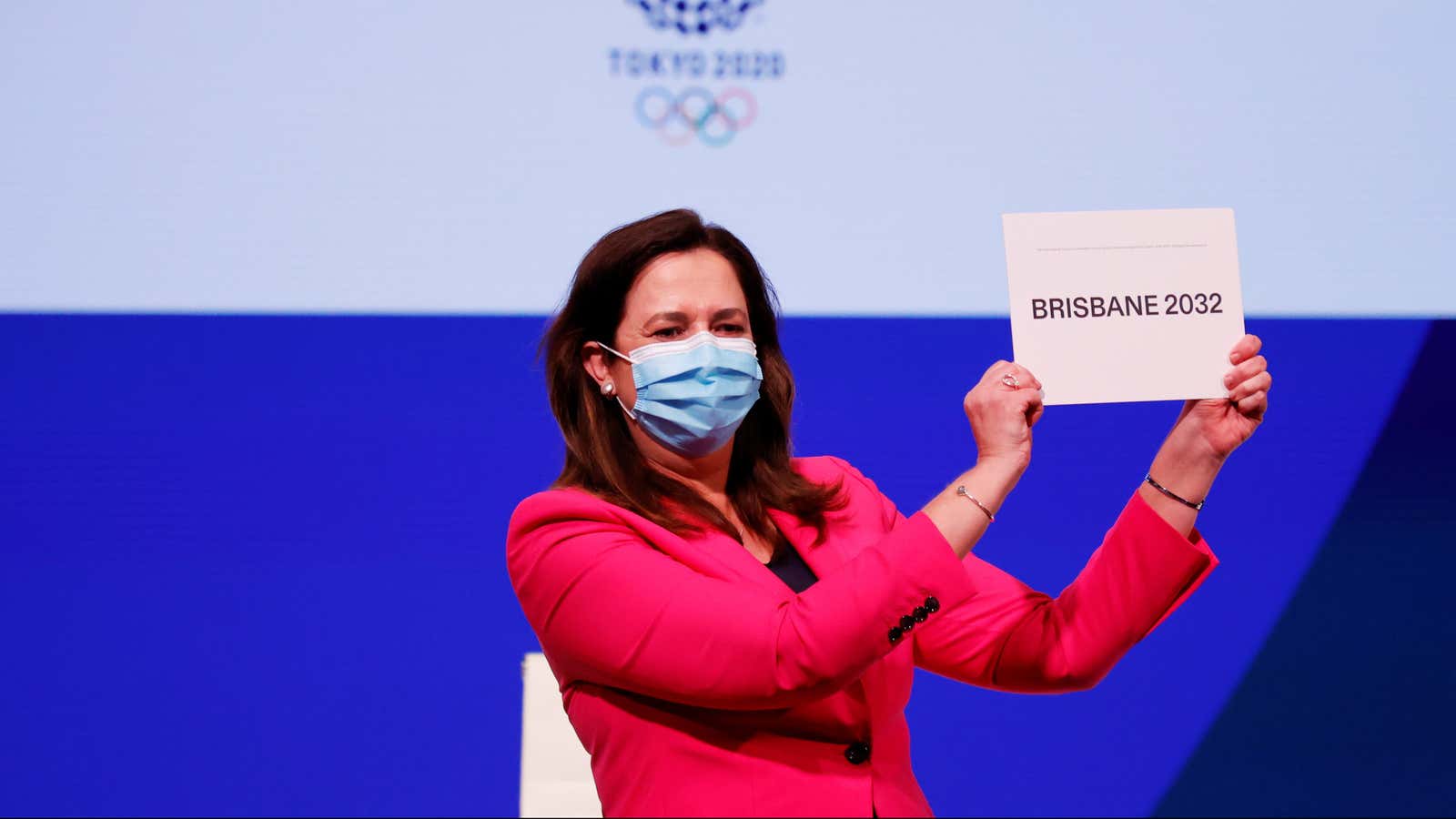Brisbane, Australia will host the 2032 Olympics. The city won the bid to host the games.
In a historic decision, Brisbane, Australia has been selected as the host city for the 2032 Olympics. Known for its stunning natural landscapes, vibrant culture, and excellent sporting facilities, Brisbane’s successful bid comes as no surprise. The city will now undergo significant preparations and construction to ensure a seamless and unforgettable Olympic experience.
With its modern infrastructure and commitment to sustainability, Brisbane is poised to provide athletes and spectators with state-of-the-art venues and sustainable practices. The 2032 Olympics in Brisbane will undoubtedly be a global celebration of athleticism, diversity, and unity. As the countdown begins, the world eagerly anticipates witnessing extraordinary performances and unforgettable moments in this extraordinary Australian city.
Sustainability Efforts For The 2032 Olympics
The sustainability efforts for the 2032 Olympics are under consideration as various cities compete to host the event.
Introduction To Sustainability In Hosting the Olympic Games
The 2032 Olympic Games are not just about showcasing athletic talent and celebrating the spirit of competition; they also present an opportunity to promote sustainable practices and leave a positive environmental legacy. Hosting such a grand event requires careful planning and consideration of various factors, including the impact on the environment. In this section, we will explore the sustainability efforts undertaken for the 2032 Olympics and how potential host cities are incorporating green initiatives to create a more sustainable Games.
Overview Of The Bidding Process For The 2032 Olympics
The bidding process for the 2032 Olympics is a rigorous and competitive journey that involves multiple stages of evaluation. Alongside the traditional criteria like infrastructure, transportation, and venue readiness, sustainability is increasingly becoming a key consideration for the International Olympic Committee (IOC). Potential host cities are evaluated on their commitment to sustainable development and environmental preservation. This ensures that the chosen city not only has the capability to organize a successful Games but also embraces sustainable values.
The Importance Of Sustainability For The 2032 Olympics
Sustainability plays a crucial role in the planning and execution of the 2032 Olympics. Hosting such a large-scale event creates tremendous opportunities to address environmental challenges, raise awareness about conservation, and inspire positive change. By prioritizing sustainability, the 2032 Olympics can become a global platform for showcasing innovative practices and technologies that can be adopted worldwide. Moreover, integrating sustainable principles into the Games’ operations minimizes negative impacts on the environment, reduces carbon footprints, and sets a precedent for future host cities to follow.
Green Initiatives Implemented By Previous Olympic Hosts
Previous Olympic hosts have already made significant strides in implementing green initiatives during the Games. Barcelona 1992, for example, focused on urban redevelopment, transforming neglected areas into green spaces, and improving public transportation infrastructure. London 2012 implemented an ambitious waste management program, recycling and reusing materials to minimize waste generation. Rio de Janeiro 2016 aimed to leave a lasting legacy by implementing renewable energy projects, water conservation measures, and reforestation programs. These examples demonstrate that sustainable practices can be integrated successfully into Olympic Games.
Environmental Considerations For Potential 2032 Olympic Host Cities
When evaluating potential host cities for the 2032 Olympics, a range of environmental considerations comes into play. These include assessing a city’s commitment to renewable energy sources, waste management systems, green transportation, and utilizing existing infrastructure to minimize the need for construction. Potential host cities are expected to provide comprehensive plans to address these considerations, ensuring that the Games leave a positive environmental impact and contribute to the city’s long-term sustainability goals.
Collaborations With Local Communities For Sustainable Olympic Games
Achieving a sustainable Olympic Games requires the collective effort of not only the organizers but also the local communities. Host cities are encouraged to collaborate with their communities, engaging residents, businesses, and organizations in sustainability initiatives. These collaborations can promote environmental education, encourage volunteerism, and create lasting partnerships for implementing eco-friendly practices. By involving the local community, the 2032 Olympics can foster a sense of ownership and inspire a sustainable mindset that extends beyond the duration of the Games.
Overall, sustainability efforts for the 2032 Olympics aim to create a benchmark for future Olympic Games and inspire global audiences to embrace sustainable practices. By integrating green initiatives, collaborating with local communities, and leaving a positive environmental legacy, the 2032 Olympics have the potential to be a game-changer in promoting sustainability in the world of sports.

Credit: qz.com
Infrastructure Requirements For The 2032 Olympics
As the anticipation for the 2032 Olympics builds up, the question of who will host the games becomes an intriguing topic. Hosting the Olympics requires meticulous planning and extensive infrastructure development. Various aspects such as transportation systems, venue construction, accommodation options, and technology advancements need to be considered to ensure a successful event. In this article, we will delve into the specific infrastructure requirements for the 2032 Olympics, focusing on transportation systems and improvements, venue construction and renovation plans, accommodation options for athletes and attendees, as well as technology and communication infrastructure advancements.
Overview Of Infrastructure Needed For Hosting The Olympic Games
Hosting the Olympic Games is no small feat. It demands significant investments in infrastructure to meet the needs and requirements of the athletes, officials, and spectators. The 2032 Olympics will require a comprehensive infrastructure that encompasses transportation systems, venue construction and renovation, accommodations, and technology advancements. A seamless integration of these components is essential to provide a memorable experience for all involved.
Transportation Systems And Improvements Required
Efficient transportation systems are a cornerstone of any successful Olympic Games. The host city will need to invest in upgrading existing transportation infrastructure and implementing new systems to accommodate the influx of visitors. This includes improvements to roads, airports, railway connections, and public transportation networks. Not only must these systems be able to handle the increased demand during the games, but they also need to ensure smooth connectivity between venues, accommodation sites, and other key locations.
Venue Construction And Renovation Plans
The construction and renovation of venues are crucial aspects of hosting the Olympics. The host city needs to assess its existing infrastructure and determine which venues require upgrades or new constructions. This may involve renovating existing stadiums or building state-of-the-art facilities capable of accommodating various sporting events. The venues should not only meet the standards set by the International Olympic Committee but should also provide an unforgettable experience for athletes and spectators alike.
Accommodation Options For Athletes And Attendees
With an influx of athletes, officials, and attendees, the host city must ensure an abundance of suitable accommodation options. This includes hotels, apartments, and Olympic villages capable of providing comfortable and convenient living spaces. The accommodation facilities should be strategically located in proximity to the venues, allowing for easy access and efficient transportation. The host city must also consider the needs and preferences of the athletes, ensuring that their stay is both enjoyable and conducive to top performance.
Technology And Communication Infrastructure Advancements
The 2032 Olympics will undoubtedly embrace the latest technological advancements to enhance the overall event experience. The host city will need to invest in robust technology and communication infrastructure, including high-speed internet connectivity, enhanced mobile networks, and secure data management systems. These advancements will allow for smooth communication between athletes, officials, and spectators and enable seamless live streaming and broadcasting of events. With the world becoming increasingly interconnected, the host city must leverage technology to engage global audiences and leave a lasting digital legacy.
Economic Impact Of Hosting The 2032 Olympics
When a city is awarded the opportunity to host the Olympic Games, not only does it become a global spectacle for sport enthusiasts, but it also brings significant economic benefits to the host country and city. The economic impact of hosting the 2032 Olympics cannot be understated, as it has the potential to transform the local economy and leave a lasting legacy. In this article, we will take a closer look at the various aspects of this impact, including the economic benefits, job creation, tourism, and infrastructure investment.
Introduction To The Economic Benefits Of Hosting The Olympics
Hosting the Olympics has been known to provide significant economic benefits to the host city and country. It brings in a surge of investment and spending, which stimulates the local economy. With millions of people attending the event, the host city experiences an influx of tourists, resulting in increased business opportunities for local entrepreneurs, restaurants, hotels, and retailers. Moreover, hosting the Olympics showcases the city as a global destination, attracting foreign investment, and fostering long-term economic growth.
Analysis Of The Economic Impact On Previous Host Cities
Past host cities of the Olympic Games have experienced a positive economic impact. For instance, the 2012 London Olympics boosted the city’s economy by an estimated £9.9 billion. This revenue was generated through various channels such as ticket sales, hospitality, and sponsorship. Similarly, the 2016 Rio Olympics injected around $6.2 billion into Brazil’s economy, primarily from infrastructure development and increased tourism. These examples illustrate how hosting the Olympics can deliver substantial economic benefits to the local economy and create a ripple effect throughout the country.
Job Creation And Opportunities For The Local Workforce
One of the significant advantages of hosting the Olympics is the potential for job creation and employment opportunities. The preparations leading up to the event require a vast workforce, ranging from construction workers and event planners to security personnel and volunteers. As a result, the host city witnesses a surge in employment, reducing unemployment rates and providing individuals with income-earning opportunities. This boost in employment not only supports the local workforce but also leads to increased consumer spending and further economic growth.
Increased Tourism And Its Economic Benefits
The Olympics serve as an international showcase, drawing in visitors from around the world. The influx of tourists boosts the local tourism industry, resulting in increased revenue for hotels, restaurants, attractions, and retail businesses. Moreover, the exposure gained during the Olympics often leads to sustained tourism growth even after the games have concluded. This lasting impact on the tourism sector provides continuous economic benefits for the host city and stimulates further development in the travel and hospitality industries.
Investment In Infrastructure And Urban Development
Hosting the Olympics necessitates significant investments in infrastructure and urban development. The host city typically undergoes extensive upgrades to accommodate the influx of athletes, spectators, and media. New stadiums, arenas, transportation networks, and other facilities are built, leaving a lasting legacy of improved infrastructure for the local community. These investments not only enhance the quality of life for residents but also attract further investment and support continued economic growth long after the Olympic Games have come to an end.
Challenges And Considerations For Potential Host Cities
The privilege of hosting the Olympics is undoubtedly a momentous opportunity for any city. Yet, taking on the responsibility of organizing the 2032 Olympics comes with its fair share of challenges and considerations. As potential host cities jockey for the coveted position, they must carefully navigate a diverse range of concerns, ranging from financial implications to security measures. In this article, we explore some of the pressing issues that cities vying for the honor of hosting the 2032 Olympics must grapple with.
Financial Implications And Budgeting Challenges
The financial implications of hosting the Olympics can be substantial, leading to complex budgetary considerations for potential host cities. While the event provides an opportunity for economic growth, the investment required to build state-of-the-art facilities, improve infrastructure, and accommodate a significant influx of visitors cannot be underestimated. Balancing the budget amidst these demands is a crucial task that requires meticulous planning and efficient execution.
Balancing Economic Benefits With Environmental Sustainability
The pursuit of economic benefits often goes hand in hand with concerns for environmental sustainability. Host cities face the challenge of ensuring that their preparations for the Olympics align with responsible environmental practices. This involves minimizing carbon emissions, incorporating renewable energy sources, and implementing sustainable waste management systems. Striking a balance between economic growth and ecological preservation is essential to ensure a lasting and positive legacy for both the city and the planet.
Legacy Planning And Post-olympic Use Of Facilities
Hosting the Olympics goes beyond the event itself – it presents an opportunity to leave a long-lasting legacy in the host city. It is crucial for potential hosts to consider the post-Olympic use of facilities and infrastructure. Optimal planning is required to repurpose Olympic venues and repurpose temporary structures effectively. Creating sustainable uses for these facilities such as converting them into community centers, parks, or educational institutions can contribute to the long-term development of the city and its surrounding areas.
Addressing Potential Social And Political Impacts
Hosting the Olympics often brings social and political implications that potential hosts must address. It is imperative to engage with local communities, ensuring that they benefit from the event and are not negatively impacted. Moreover, potential political ramifications must also be taken into account, as the Olympics can shine a global spotlight on the host city and its government. Balancing the interests and concerns of diverse stakeholders is crucial to ensure that the event leaves a positive mark on both society and politics.
Security Measures And Preparations For The Games
Ensuring the safety and security of participants and spectators is paramount for any host city. Adequate security measures must be put in place to mitigate potential risks and threats. This includes comprehensive planning, coordination with local law enforcement agencies, and implementing robust security protocols for venues, accommodation, and transportation. By prioritizing security preparations, potential host cities can offer a safe and memorable Olympic experience for all involved.
Global Competition For Hosting The 2032 Olympics
The selection of a host city for the Olympic Games is a highly anticipated event that attracts countries from around the globe. The 2032 Olympics will continue this tradition by sparking a fierce global competition among potential host cities. With the honor and prestige of hosting the world’s largest international sporting event at stake, numerous cities have submitted their bids, each highlighting their unique offerings and advantages. A thorough analysis of the bidding process, strengths and weaknesses of each bid, political and diplomatic considerations, and potential long-term benefits will shape the selection process. Let’s dive into the exciting world of the 2032 Olympics bidding process!
Overview Of The Bidding Process For The 2032 Olympics
The bidding process for the 2032 Olympics follows a rigorous evaluation to identify the most qualified host city. The International Olympic Committee (IOC) initiates the process by inviting interested cities to present their bids. After the initial submission, an evaluation committee assesses each bid in terms of infrastructure, venue readiness, sustainability, and financial capabilities. The shortlisted cities then enter a more intensive phase, during which they provide detailed plans, budgets, and support from the local community. Finally, the IOC votes and selects the winning host city.
Potential Host Cities And Their Unique Offerings
A number of potential host cities have emerged for the 2032 Olympics, each with its own unique offerings. Among the frontrunners are Brisbane (Australia), Jakarta (Indonesia), Delhi (India), and Shanghai (China). Brisbane, known for its stunning coastline, vibrant cityscape, and passion for sports, envisions an Olympics focused on environmental sustainability and fostering community engagement. Jakarta, a bustling megacity, plans to showcase its vibrant culture, diverse heritage, and excellent sporting facilities. Delhi aims to leverage its experience in hosting the 2010 Commonwealth Games, emphasizing its historical landmarks, world-class infrastructure, and commitment to inclusivity. Shanghai, a global economic powerhouse, boasts state-of-the-art venues, cutting-edge transportation systems, and a vision of showcasing Chinese culture to the world.
Analysis Of The Strengths And Weaknesses Of Each Bid
Each bid presents its own strengths and weaknesses. Let’s take a closer look at the leading contenders:
| City | Strengths | Weaknesses |
|---|---|---|
| Brisbane | Stunning coastline, commitment to sustainability | Limited existing infrastructure, potential impact on local environment |
| Jakarta | Vibrant culture, excellent sporting facilities | Traffic congestion, potential logistical challenges |
| Delhi | Historical landmarks, experience hosting major games | Air pollution, concerns over safety and security |
| Shanghai | World-class venues, advanced transportation systems | Competition from other Chinese cities, potential smog issues |
Political And Diplomatic Considerations In The Selection Process
The selection process for the 2032 Olympics also involves political and diplomatic considerations. Host cities are expected to maintain peaceful international relations and demonstrate stability in their political landscape. The potential impact of the Olympics on improving diplomatic ties and fostering global cooperation is carefully assessed. Additionally, the hosting nation’s commitment to upholding Olympic values, such as inclusivity and anti-discrimination, is a significant factor in the selection process.
Evaluating The Potential Legacy And Long-term Benefits For Each Host City
One crucial aspect of selecting a host city involves evaluating the potential legacy and long-term benefits for the chosen location. The Olympics can leave a lasting imprint, transforming a city with improved infrastructure, increased tourism, and economic growth. Ensuring a comprehensive legacy plan, including repurposing of venues and sustainable development initiatives, is crucial for the continued prosperity of the selected host city. Assessing the social, cultural, and economic impact of hosting the Olympics is therefore a vital consideration for the IOC.
Emerging Trends And Technologies In Olympic Hosting
The future of hosting the Olympic Games is being shaped by emerging trends and technologies. With each passing edition, the Games seek to integrate new innovations that enhance the experience for both athletes and spectators. In this article, we will explore the latest developments in Olympic hosting and how they are set to transform the landscape of the 2032 Olympics.
Technological Advancements Shaping The Future Of Olympic Games
When it comes to hosting the Olympics, technology plays a crucial role in ensuring a seamless and unforgettable experience. In recent years, the integration of emerging technologies such as artificial intelligence, blockchain, and Internet of Things has revolutionized various aspects of the Games. From enhanced security measures to improved athlete performance tracking, these advancements have redefined what it means to host the Olympics in the digital age.
Utilizing Smart City Concepts For Enhanced Efficiency
In the quest for efficiency and sustainability, host cities are increasingly embracing the concept of smart cities. By leveraging cutting-edge technologies and data-driven solutions, these cities are able to optimize their infrastructure, transportation systems, and energy management. Through the implementation of smart grids, autonomous vehicles, and intelligent waste management systems, host cities can not only enhance the Olympic experience but also leave a lasting legacy of sustainability for the future.
Virtual And Augmented Reality Experiences For Fans And Athletes
As technology continues to advance, virtual and augmented reality (VR/AR) experiences are set to transform the way fans and athletes engage with the Olympic Games. VR/AR technologies offer immersive and interactive experiences, allowing fans to feel like they are right in the heart of the action. Athletes, on the other hand, can benefit from VR/AR training programs that simulate competition environments and help them prepare for the Games in a more efficient and effective way.
Innovative Ticketing And Spectator Engagement Initiatives
Gone are the days of queuing up for tickets and passively watching the Games. The future of Olympic hosting lies in innovative ticketing and spectator engagement initiatives. From personalized ticketing platforms that offer tailored experiences to fan zones equipped with state-of-the-art screens and interactive activities, host cities are finding new ways to create unforgettable moments for fans. These initiatives not only boost spectator excitement but also drive revenue and increase the overall success of the Games.
Legacy Of Technology For Host Cities Beyond The Games
One of the key considerations for host cities is ensuring a lasting legacy that extends beyond the Olympic Games. By embracing and leveraging technology, host cities can create a legacy that extends far beyond the closing ceremony. Whether it’s the development of smart infrastructure, the establishment of tech innovation hubs, or the implementation of sustainable practices, the impact of technology on host cities can be felt long after the Games have concluded.
Frequently Asked Questions For Who Will Host The 2032 Olympics?
Who Hosted The Previous Olympics?
The previous Olympics were hosted by Tokyo, Japan in 2020.
How Are Host Cities Selected For The Olympics?
Host cities for the Olympics are selected through a competitive bidding process conducted by the International Olympic Committee (IOC).
What Factors Are Considered When Choosing A Host City?
The factors considered when choosing a host city for the Olympics include infrastructure, financial capability, security, transportation, and sustainability plans.
When Will The Host City For The 2032 Olympics Be Announced?
The host city for the 2032 Olympics will be announced by the International Olympic Committee (IOC) in the coming years.
Which Countries Are Potential Candidates To Host The 2032 Olympics?
Several countries such as Australia, Germany, India, Indonesia, Qatar, and Spain have expressed interest in hosting the 2032 Olympics, but the final decision is yet to be made.
Conclusion
After examining potential host cities and evaluating various factors, it remains uncertain who will host the eagerly anticipated 2032 Olympics. The decision will depend on a multitude of considerations, such as infrastructure, sustainability, and political stability. As the bidding process progresses, it is of utmost importance to select a city that can showcase the Olympic spirit and legacy while ensuring a memorable experience for athletes and spectators alike.
Stay tuned for the exciting announcement in the future!






